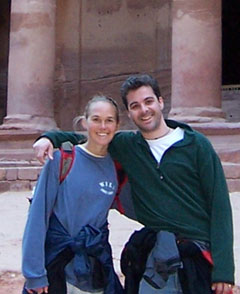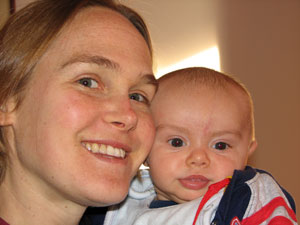|
|

| July 2007 Maia Carter Hallward, '98, Searches for Answers to Peace, Justice in Middle East 9/11 changed a lot of things for a lot of people. For Maia Carter Hallward, ’98, who had entered the School of International Service at American University just a few weeks earlier in August 2001, it changed her decision about the kind of research to pursue in her doctoral program. The events of 9/11 underscored the explosive, urgent state of affairs in the Middle East and led Hallward, only recently returned from three years of working in the Middle East, to shift the focus of her doctoral research from international development to the volatile relationship between Israelis and Palestinians. Hallward first traveled to the Middle East during the summer of 1997 when she accompanied her parents on a project trip to the Ramallah Friends Schools, an elementary school and a secondary school founded in the West Bank in 1889 by Quakers. Hallward said her family, who are Quakers, had previous ties to the schools. A great-great-aunt taught there, as did Hallward’s father when he was a conscientious objector during the Vietnam War. Hallward followed her family’s tradition and returned to the West Bank to teach geography, world history and U.S. history to middle school and high school students at the Ramallah Friends Schools for two years immediately following her college graduation in 1998. She described Ramallah as the default capital of Palestine and home to many well-educated Palestinians as well as many international residents. She found the Palestinians incredibly hospitable and welcoming of her and other Westerners; only occasionally did she overhear whispered disapprovals as she walked through the city’s crowded streets. “It was more challenging being a woman than being a Westerner,” Hallward said. “I was living in Ramallah during the Monica Lewinsky scandal. U.S. movies show a particular image of women as loose and easy. I’m a blonde, blue-eyed, single woman walking around by myself.” Overall, however, Hallward delighted in the many friendly interactions she had with the Palestinian people. She also enjoyed soaking up the culture and learning about the politics of the region. And she was struck by the beautiful scenery and spectacular Roman ruins she saw on her visits to neighboring Lebanon and Syria. In June 2000 Hallward moved from the West Bank to Amman, Jordan, where she spent six months conducting research at the >United Nations University International Leadership Academy in support of an upcoming conference on peace building. She credited professor Joanne Ciulla, who held the UNESCO chair at the academy, with helping her land the job. Hallward finished out her year in Jordan teaching third grade at the American Community School, a private college preparatory school serving American and expatriate students from the business and diplomatic communities as well as Jordanian nationals. She returned to the United States in time to start graduate school in August 2001. As a doctoral candidate studying Israeli-Palestinian relations, Hallward focused much of her research on the continued operation of Israeli and Palestinian peace and justice groups, despite a return to violent conflict in the region after years of failed attempts to rejuvenate a stalled peace process associated with the Oslo Accords. She spent a summer immersed in the intensive Arabic-language program at Middlebury College and then conducted her field research in Israel and the Occupied Palestinian Territories from September 2004 to June 2005 while simultaneously studying Hebrew at the Hebrew University of Jerusalem. Hallward completed her doctoral degree in May 2006 and moved to Atlanta, Ga., to join the Department of Political Science and International Affairs at Kennesaw State University where she teaches courses such as Introduction to International Relations, Politics of the Middle East and Politics of Developing Areas. Her classes sometimes have as many as 70 to 80 students, she said. She teaches some online classes to accommodate the university’s many nontraditional students. Hallward incorporates much of what she learned at Jepson into her teaching methodology. For example, she assigned group projects to her students last semester despite their protestations. “I told them they could learn a lot from working in groups,” she said. Her students must also employ critical-thinking skills when they write papers that examine the application of particular cases. “I want my students to look beyond Fox News, to try to approach a problem from a variety of perspectives and to apply and critique theories rather than just regurgitate course material,” she said. Hallward strives to provide her students with the sense of belonging and respect she experienced as an undergraduate. “Our professors at Jepson treated us as a member of the community. They really appreciated our contributions and made us responsible for our education.” The demands of a tenure-track job can prove challenging at times. In addition to her teaching responsibilities, Hallward has served on several search committees reviewing applicants for faculty positions, researches peace and civil society groups in the Middle East, makes presentations at conferences, writes articles for publication and serves on the editorial board of the peer-reviewed Journal of Peacebuilding and Development. “He’s been dragged to so many committee meetings and even attended a conference where I was presenting,” she said. “People remark to me that the freshmen are getting younger every year.” |

 Now she has one more thing to juggle—the care of her
son, Graham Deichler Hallward, born December 15, 2006. “He’s
absolutely delightful and quite mellow,” she said, making it possible
for him to accompany her to work at times.
Now she has one more thing to juggle—the care of her
son, Graham Deichler Hallward, born December 15, 2006. “He’s
absolutely delightful and quite mellow,” she said, making it possible
for him to accompany her to work at times.